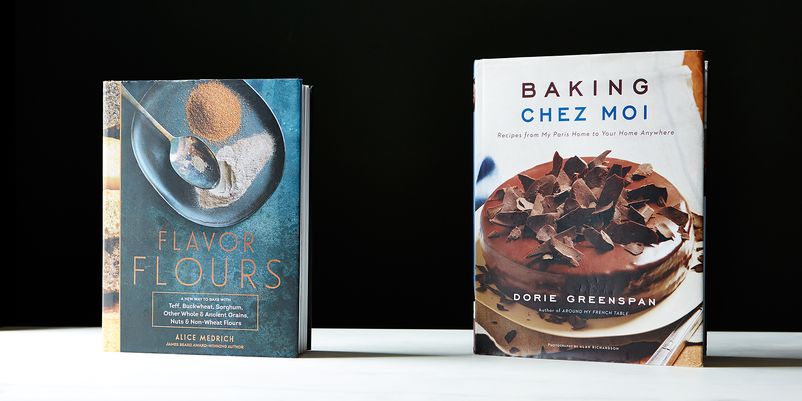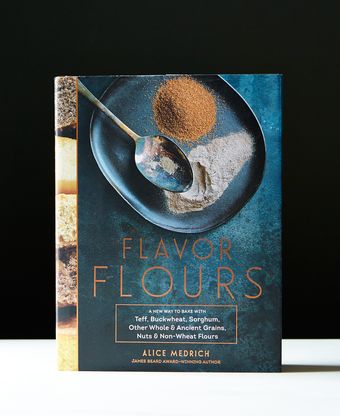It has become tiresome to hear people say, “I don’t like sweets,” and frankly, I call bullshit on it. Who doesn’t like sweets? At least when they’re delicious sweets? It's likewise become tiresome to hear people say, “I like cooking, not baking.” I’m tired of it too, but I’m going to go ahead and say it.
Because with the former, I can confidently improvise; I can be less than precise; I can have fun. But the exacting rigors of the latter stand in direct opposition to my indolence, and quite honestly make me nervous. Baking always struck me as cooking for math majors, not for English literature majors who focused on Romantic poetry. I can make a creditable olive oil cake, indisputably excellent buttermilk biscuits, and an honest, satisfactory cobbler. That’s about the extent of my baking repertoire. Normally, when I throw a dinner party, dessert is cheese and fruit and chocolate. And that’s how I like it. Listen, I love good sweets and other baked goods, unashamedly, and I certainly wouldn’t turn down a beribboned box of éclairs or a freshly baked, lovingly latticed pie -- but I don’t want to make them myself.
So when Food52 sent me two godforsaken baking-centric books to judge for the Piglet, my immediate impulse was to chuck them out the window. But I’d made a commitment -- and I like to think I’m no whiner -- so with a stiff upper lip and just a little rage and resentment burning within me, I dove into Dorie Greenspan’s Baking Chez Moi and Alice Medrich’s Flavor Flours.
You know what?
There’s nothing godforsaken about either of these books. They’re both great. Even if they are about -- bah! -- baking.
Greenspan and Medrich are both total, time-tested pros: They’re sure-footed, experienced, and authoritative cooks and writers, who also happen to be excellent teachers. And that’s what I want most from cookbooks: To be taught, clearly and expertly, so that I fully comprehend the lessons and feel certain that I can take on the recipes myself, no matter how advanced.
And a significant part of Greenspan’s mission with Baking Chez Moi is to assuage fears about what is often (and not entirely wrongly) considered the formidable fussiness of French baking. She makes this abundantly clear with a spirited salvo in the introduction: “Here’s what I know: Real French people don’t bake! At least they don’t bake anything complicated, finicky, tricky or unreliable…When the French bake at home, they bake for love, for the people they care about most and for the joy of making them happy.”
Who could argue with that? Dorie Greenspan’s prose is as warm as a galette straight out of the oven; I could almost feel her encouraging presence with me in the kitchen as I cooked. I could picture her there by my side, rooting through my pantry for those vanilla beans lurking somewhere in the back, handing me a whisk, then helping with the dishes. I could easily imagine her saying out loud exactly what she writes in her introduction to a recipe for Lavender White Chocolate Pots de Crème: “There’s something so Winnie-The-Pooh about pots de crème, and something so utterly grown-up and sophisticated too,” and I could imagine myself nodding and smiling in delighted agreement. And if something goes wrong -- a soufflé doesn’t rise, a tart comes out less glossy than you’d hoped -- she’d have a funny tale to tell about the time, long ago, when she messed it up too. I might not believe she ever messed anything up -- she’s Dorie Greenspan, after all -- but I’d be grateful for the soothing, sweetly comic story anyway.
I thought about making those pots de crème, but I’d already decided to test one of the less complicated-sounding cakes from each book (I like cake), and from Greenspan’s I went with the Saint-Pierre Poppy Seed Cake. I chose it partly because I happened to have a stack of clementines on hand (they’re among my favorite things about winter), and a bag of poppyseeds, and the thought of these flavors together was impossible to resist.
But I also chose it because Greenspan’s introductions to her recipes are frequently -- as with the pots de crème prologue -- deeply alluring narratives, and I particularly appreciated the one attached to this cake, in which a Frenchman beseeches her (“with a twinkle,” no less) to make it. It's a good cake, and I’d make it again -- I liked its texture and its just-right-not-too-sweetness, but I expected fuller flavor from it. Next time I’d take Greenspan’s advice to those who’d “like to pump up the flavor” and add a tiny bit of orange oil. I’d also mind her counsel, next time around, about the freshness and quality of the poppyseeds: Mine had not been stored, as she advises, in an airtight container in the freezer. They’d likely languished in a cabinet for a year or more. But the instructions were lucid and easy to follow, and it was easy to see why monsieur had requested she make the cake. The recipe delivered on the promise of the alluring introduction.
From Flavor Flours, I tried out the Carrot Spice Cake with Cream Cheese Frosting. Carrot cake, at least a more conventional version, has long been part of my limited baking repertoire. I should also disclose here that I’m a shameless and unreconstructed hippie -- I was cooking pots of quinoa for Deadheads in a cabin in the Santa Cruz mountains decades before any self-respecting non-vegan restaurant would have put it on a menu -- so it obviously follows that carrot cake is one of my favorite foods. I’m sure that in my life I’ve tasted about a hundred different versions of it, and made at least a dozen. And I want to tell you that Medrich’s, made with rice flour and oat flour, is the best I’ve ever made, the best I’ve ever eaten, just the best: moist but solidly constructed, intensely fragrant, and full-flavored.
The book is sensibly organized according to the flours that dominate the recipes in each chapter: Rice, Oat, Corn, Buckwheat, Chestnut, Teff, Sorghum, and Nut, and Medrich makes strong cases for all the ingredients she discusses -- brown rice flour lends a lovely toasty and caramel quality to much that it touches, sponges benefit from chestnut flour’s smoothness, and sorghum’s slight sweetness makes it a good companion to other sweet flavors we associate with the cooking of the American South. She acknowledges that working with some of these flours requires patience and adaptation. She can sound stern at turns -- “Pay close attention to the mixing instructions; your opinions about buckwheat depend on it.” -- but, as with all good and exacting teachers who truly want their students to learn, you know it’s for your own good. (Flavor Flours often felt to me like taking a class grudgingly, just to fulfill a requirement, and winding up loving it.)
Medrich’s book, for all of its elegance and sophistication, still spoke to my hippie self. For all my unabashed earthy-crunchiness, and despite my early adoption of quinoa, I hardly knew what to do with any of these grains before I cracked open Flavor Flours. And I didn’t particularly think I wanted to know, mostly out of a grudging suspicion that they’re both too trendy and too much the domain of anti-wheat militants. But I never felt that Medrich was catering to the trendy or the intolerant; rather, she’s honoring and creatively engaging the distinctive qualities of less familiar grains. Her writing may not share the friendly intimacy of Greenspan’s, but there are times in the kitchen when I don’t so much need a friend as I need someone to tell me exactly what to do and precisely what I need to know.
I’m tempted to call a draw here, but that’s not what I’ve been tasked to do, even if I have come to consider the two books equals in terms of excellence. Baking Chez Moi is probably the most user-friendly approach to French baking I’ve ever encountered. But much within it still felt familiar, if cast in less intimidating terms. Greenspan and Medrich are both great teachers. But ultimately I had to pick Flavor Flours as the winner, because it did something that books don’t do very often: It changed my mind. I’d never even considered using sorghum or teff flours before, and admit, with mild shame, to skepticism about most things gluten-free. (Medrich doesn’t force that issue at all here, and lets the flours reveal their own virtues in themselves.) Now? I know for sure I’ll never make a carrot cake with wheat flour again.




55 Comments
I had the pleasure and great fortune to meet Dorie in person at one of her book signings. She is everything you've heard about - kind, gracious, helpful, and she gives the best hugs - pretty much the same thing her cookbooks deliver.
I don't have many Alice Medrich cookbooks, but I will rectify that very soon!
Thank you for a great a review!